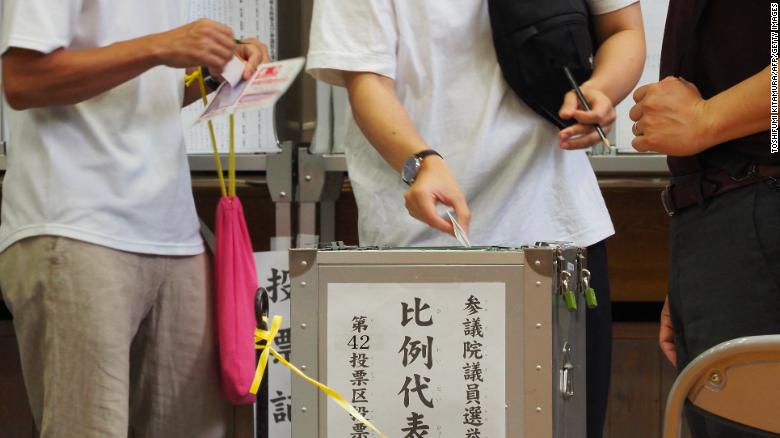
Tokyo – Japanese voters headed to the polling stations on Sunday for an election billed as a defense of democracy, just two days after former Prime Minister Shinzo Abe was assassinated while on the campaign trail.
Abe was shot in broad daylight on Friday in the central city of Nara while giving a speech in support of a local candidate for his Liberal Democratic Party, in a killing that has reverberated around the world.
The killing has also raised questions over the lack of security surrounding Abe at the time of the shooting, with the local police chief admitting “problems” and public broadcaster NHK reporting the suspect had initially planned to use explosives.
With Japan in mourning, observers say a wave of additional support could swell what was already expected to be a comfortable victory for Abe’s party in the upper house election on Sunday.
Japanese Prime Minister Fumio Kishida — who described Abe’s killing as a “cowardly and barbaric act” — has appealed to the public to turn out to vote, casting the election as a defense of democracy.
“We must absolutely defend free and fair elections, which are the basis of democracy. We will proceed with our election campaign as planned with the firm conviction that we will never yield to violence,” Kishida said on Friday.
Polls opened at 7 a.m. Sunday morning local time and will close in most of the 46,017 stations at 8 p.m. local time. Over 125 seats are being contested by 545 candidates.
Murder suspect speaks
Police arrested 41-year-old Tetsuya Yamagami at the site of the shooting on Friday. They say he is suspected of murder but has not been formally charged.
Yamagami told investigators he had initially intended to kill Abe by using explosives at an event in Okayama, a prefecture that is a three-hour drive from Nara, Japanese public broadcaster NHK reported Sunday.
“I was thinking about killing the former prime minister there (Okayama), but I saw that there were admission procedures at the entrance and I felt it would be difficult to get in”, Yamagami told investigators, according to NHK.
Yamagami was taken to the Nara District Prosecutor’s Office Sunday morning.
Nara Prefecture police told CNN on Saturday that surveillance cameras showed the suspect leaving the Yamato-Saidaiji Station in Nara on Friday after taking the train and heading for the Abe event.
The killing has raised questions about the level of security given to Abe.
The Nara police chief, Tomoaki Onizuka, said on Saturday he “can’t deny there were problems” with Abe’s security, and that he “take[s] responsibility” for the failure.
“After the first report of the incident came … it was the height of the guilt and regret I’ve felt in my 27 years in law enforcement,” an emotional Onizuka said.
“I feel the weight of my responsibility.”
Elections underway
Campaigning was suspended on Friday following Abe’s killing, but politicians resumed pre-election activities on Saturday.
While the upper house is the less powerful of the Japanese parliament’s two chambers — and can be overridden by the lower house in vital matters — a strong showing for the LDP could help Kishida push through an agenda that includes boosting defense spending and possibly revising Japan’s pacifist constitution. Both of these causes had been championed by Abe before his death.
“The ruling LDP-Komeito coalition was already on course for a solid victory,” James Brady of the Teneo consultancy said in a note published by Reuters. “A wave of sympathy votes now could boost the margin of victory.”
Brady added that in the months ahead the government is “certain to seek to strengthen domestic security.”
Polls taken before Abe’s death had forecast the LDP to win at least 60 of the 125 seats being contested on Sunday, compared with the 55 it now holds, Reuters reported, allowing it to maintain the majority it holds with its junior coalition partner Komeito.
Reaching 69 seats in the upper house would give the LDP a majority, a threshold that had been seen as a stretch prior to Abe’s killing, and possibly boost its ability to push through its agenda, Reuters reported.
A world in mourning
Since Abe’s death, mourners in Japan have been gathering and placing flowers at a makeshift memorial outside the Yamato-Saidaiji Station in Nara, close to where the former leader was gunned down.
But the reverberations of the killing have been felt far beyond Japan’s borders, where there has been widespread shock that a former prime minister who had defined politics for a generation could be shot dead at close range in a country with one of the world’s lowest rates of gun crime.
Presidents, prime ministers and other international leaders have sent tributes expressing outrage and sadness over the killing.
The US State Department said on Saturday that Secretary of State Antony Blinken will travel to Tokyo on Monday to pay his respects to the Japanese people.
State Department Spokesman Ned Price said Blinken would also meet senior Japanese officials, adding that “the US-Japan Alliance is the cornerstone of peace and stability in the Indo-Pacific and has never been stronger.”
Abe’s funeral will be held over Monday and Tuesday, his office told CNN, with a wake on Monday to be followed by a memorial service on Tuesday.
The funeral will be hosted by his widow Akie Abe at a temple in Tokyo and attendance limited to family members and people who were close to the former prime minister, Japan’s public broadcaster NHK reported.
As reported by CNN
